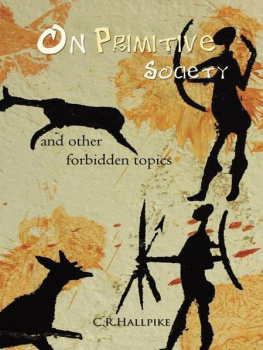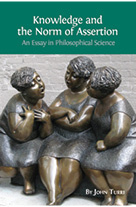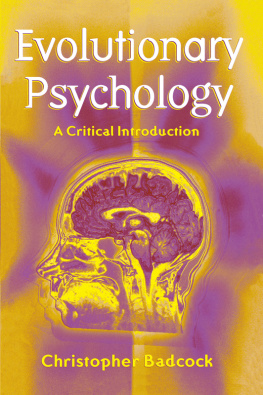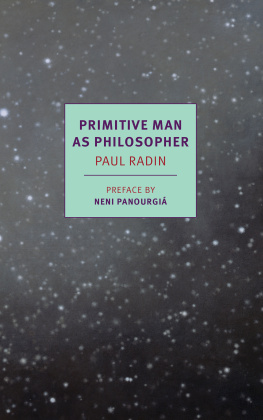On Primitive Society
And other forbidden topics
C.R.Hallpike

AuthorHouse
1663 Liberty Drive
Bloomington, IN 47403
www.authorhouse.com
Phone: 1-800-839-8640
2011 by C.R.Hallpike. All rights reserved.
No part of this book may be reproduced, stored in a retrieval system, or transmitted by any means without the written permission of the author.
First published by AuthorHouse 09/02/2011
ISBN: 978-1-4567-8378-5 (sc)
ISBN: 978-1-4567-8379-2 (ebk)
Library of Congress Control Number: 2011909595
Printed in the United States of America
Any people depicted in stock imagery provided by Thinkstock are models, and such images are being used for illustrative purposes only.
Certain stock imagery Thinkstock.
This book is printed on acid-free paper.
Because of the dynamic nature of the Internet, any web addresses or links contained in this book may have changed since publication and may no longer be valid. The views expressed in this work are solely those of the author and do not necessarily reflect the views of the publisher, and the publisher hereby disclaims any responsibility for them.
C ONTENTS
Acknowledgements
The author is grateful to the editors of the various journals and books in which these papers were first published for permission to reprint them in this volume.
Introduction
When we study anthropology and the other human sciences, there is an obvious temptation to be swayed by our basic philosophical and political beliefs, and the fashionable enthusiasms and taboos of our time. But it should also be obvious that the depth of our personal convictions about, say, human equality, or the dignity of Man, or the need to give everything a materialistic explanation, can provide no guarantee that they are actually true, even if they are supported by a cheering crowd of our contemporaries. Reliance on intellectual fashion and the certainties of the thundering herd does not produce any useful debate, but merely a dialogue of the deaf, and the inability to assimilate, or sometimes even to read, the arguments of those who disagree.
The first set of dogmas that obstruct debate in anthropology are those of political correctness, and the belief in particular that all cultures are born equal. There has been a growing mania in the social sciences for perceiving discrimination and prejudice in any dispassionate discussion of human differences, so that we should not be allowed to talk about primitive society, primitive thought, or social evolution, or, for that matter, about the biological basis of human nature. Sociologists and anthropologists frequently misuse the valid principle that human culture is unique to deny that it can be influenced in any way by biology and psychology. Historically, there is no doubt that Darwinian theory was used to defend eugenics, Social Darwinism, and Nazism, and there are those who exaggerate the genetic basis of human behaviour to justify discrimination on the basis of race and gender. But this cannot be a continuing excuse for unreasoning hostility towards attempts to explain any aspects of human behaviour, society, and culture by reference to biology and psychology.
The other set of dogmas that need deflation are those of the extreme reductionist man is just an animal school of thought, which has produced a similar mania to naturalize the social sciences and humanities by bringing them under the overall control of the natural sciences, and of biology and Darwinian theory in particular. Those in the sociobiological tradition have no problem with the idea of social evolution, or of primitive society. Their aim, however, is to prove that there is nothing special about Man, and that all human culture and society, and its evolution, must be explained in strictly Darwinian terms.
One of the most striking features of both these types of dogmatists is that they are generally unwilling to listen to criticism, or seriously engage with the facts and arguments produced by their opponents, whom they variously dismiss as colonialists or creationists. They are both, in their different ways, fundamentalists and True Believers who simply know that their paradigms must be right.
The papers collected in this volume give detailed reasons and evidence to show why these paradigms are in fact illusions, but they are not simply negative. I have used this opportunity to set out my own view of what anthropology is, why human society is indeed uniquely different from any previous biological or inorganic system that has ever existed, and how it has evolved to its present condition. My earlier reference to the human sciences does not in any way imply that I believe in the possibility of a natural science of society and culture, a notion which is just as absurd as a social science of physics or chemistry. Science is the enterprise of trying to discover the general principles underlying diversity, and basing these principles on reasoned arguments and relevant factual evidence. The very first step of any science requires it to adjust its methods to the nature of what it is trying to explain, and since human sociocultural systems have some unique properties of their own, the attempt to absorb the social sciences into the physical sciences is basically misconceived.
1. Social anthropology is the study of primitive society.
The formative years of my anthropological career were spent in fieldwork, living with the Konso and the Tauade tribes in the mountains of Ethiopia and Papua New Guinea. This experience has been of inexhaustible value in my subsequent thinking on a range of theoretical topics in which I have been interested over the years, particularly primitive society and social evolution, and primitive thought. I consider these to be central to social anthropology (cultural anthropology for North Americans), which is why they are given a prominent place in this collection of papers. As I show in detail in Paper 2, Is there a primitive society?, primitive societies are systematically different in many respects from centralised states and modern industrial societies, notably in their small size and the predominance of face-to-face relations, simple technologies and subsistence economies, the importance of institutions based on the ascriptive principles of kinship, birth-order, age, and gender, and on ritual, and the lack of monetary economies, literacy, and political centralisation.
These characteristics of primitive society are quite unfamiliar to sociologists, political scientists, economists, and modern historians, and if faced with societies organized by patrilineal exogamous clans, age-grading systems, sacred drums, pay-back-killings, and ceremonial pig-feasts and blood-sacrifice, these scholars would be very much at a loss to understand what was going on. This is why it has always made logical sense for the study of primitive societies to form the distinct academic discipline of social (cultural) anthropology. This specialist knowledge has enabled anthropology to make essential contributions to archaeology, classical scholarship, history, and religious studies, for example, because of its unique understanding of primitive societies and their modes of life. In particular, a thorough grounding in traditional social anthropology should also be an essential requirement for sociobiologists, evolutionary psychologists and others who try to apply Darwinian theory to our prehistoric ancestors, but in fact they usually have only the most superficial knowledge of primitive society, as we shall see.
Moreover, understanding the full range of human potentialities involves the comparative study of all societies, but a large percentage of societies across the globe are, or have been in historical times, primitive societies. Cross-cultural studies of aggression, for example, are quite invalid unless they take into account the very large body of anthropological data on primitive warfare. Nor can one hope to understand modernisation in the Third World unless one also understands what those societies were like until recent times, and what it is that is being modernised.
Next page





![C.R. Hallpike - On Primitive Society and other forbidden topics [notes fixed]](/uploads/posts/book/62486/thumbs/c-r-hallpike-on-primitive-society-and-other.jpg)
